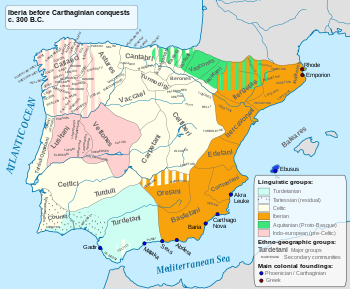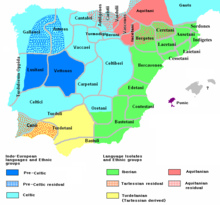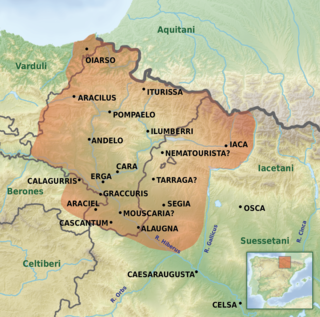



The Ilercavones were an ancient Iberian (Pre-Roman) people of the Iberian Peninsula (the Roman Hispania). They are believed to have spoken an Iberian language.




The Ilercavones were an ancient Iberian (Pre-Roman) people of the Iberian Peninsula (the Roman Hispania). They are believed to have spoken an Iberian language.
The name Ilercavonia to refer to the territory occupied by this Iberian tribe appears in ancient Greek and Roman texts and documents and it was still mentioned in medieval texts. [1] The northern limits of this territory were in Serra de la Llena, the northeastern in Coll de Balaguer, the western in Mequinensa and the southern in Sagunt.
The Ilercavones were very religious as a people. They did not have temples, but every mountain or hill was considered a sacred place. [2] The Ilercavones as a nation or tribe were already mentioned by Pliny the Elder, who said that they inhabited the lands between river Udiva (possibly the Millars River) and further north of the Ebro, and by Ptolemy, who named the cape and the harbor where they lived Tenebri (possibly Orpesa). They were mentioned as well as by Livy in his texts describing the first phase of the Roman invasion of Iberia.
After the Roman conquest the Ilercavones became romanized, much like the other Iberian tribes in the peninsula. Gradually, they became assimilated into the Roman population, especially after acquiring the Latin language as their own vernacular. [3]
The most important archaeological sites are in the following places:

Gandesa is the capital of the comarca of Terra Alta, in the province of Tarragona, Catalonia, Spain.

The Iberians were an ancient people settled in the eastern and southern coasts of the Iberian Peninsula, at least from the 6th century BCE. They are described in Greek and Roman sources. Roman sources also use the term Hispani to refer to the Iberians.

The Celtiberians were a group of Celts and Celticized peoples inhabiting an area in the central-northeastern Iberian Peninsula during the final centuries BC. They were explicitly mentioned as being Celts by several classic authors. These tribes spoke the Celtiberian language and wrote it by adapting the Iberian alphabet, in the form of the Celtiberian script. The numerous inscriptions that have been discovered, some of them extensive, have enabled scholars to classify the Celtiberian language as a Celtic language, one of the Hispano-Celtic languages that were spoken in pre-Roman and early Roman Iberia. Archaeologically, many elements link Celtiberians with Celts in Central Europe, but also show large differences with both the Hallstatt culture and La Tène culture.
The Lusitanians were an Indo-European-speaking people living in the far west of the Iberian Peninsula, in present-day central Portugal and Extremadura and Castilla y Leon of Spain. After its conquest by the Romans, the land was subsequently incorporated as a Roman province named after them (Lusitania).

The Vascones were a pre-Roman tribe who, on the arrival of the Romans in the 1st century, inhabited a territory that spanned between the upper course of the Ebro river and the southern basin of the western Pyrenees, a region that coincides with present-day Navarre, western Aragon and northeastern La Rioja, in the Iberian Peninsula. The Vascones are often considered ancestors of the present-day Basques to whom they left their name.

The Aquitanian language was the language of the ancient Aquitani, spoken on both sides of the western Pyrenees in ancient Aquitaine and in the areas south of the Pyrenees in the valleys of the Basque Country before the Roman conquest. It probably survived in Aquitania north of the Pyrenees until the Early Middle Ages.

The Celtici were a Celtic tribe or group of tribes of the Iberian Peninsula, inhabiting three definite areas: in what today are the regions of Alentejo and the Algarve in Portugal; in the Province of Badajoz and north of Province of Huelva in Spain, in the ancient Baeturia; and along the coastal areas of Galicia. Classical authors give various accounts of the Celtici's relationships with the Gallaeci, Celtiberians and Turdetani.

The Bastetani or Bastuli were an ancient Iberian (pre-Roman) people of the Iberian Peninsula. They are believed to have spoken the Iberian language. The relationship between the Iberian Bastetani and the Tartessian Mastieni is not entirely clear.

The Indigetes were an ancient Iberian (Pre-Roman) people of the eastern side of the Iberian Peninsula. They are believed to have spoken the Iberian language.

The Laietani were an ancient Iberian (Pre-Roman) people of the Iberian Peninsula. They inhabited the area occupied by the city of Barcelona. One of the main thoroughfares of the city, Via Laietana, is named after the Laietani. They are believed to have spoken an Iberian language.

The Oretani or Oretanii were a pre-Roman ancient Iberian people of the Iberian Peninsula, that lived in northeastern Andalusia, in the upper Baetis (Guadalquivir) river valley, eastern Marianus Mons, and the southern area of present-day La Mancha.

Contestani is an ethnonym of Roman Spain of the imperial period. It appears chiefly in the Greco-Roman writers Pliny the Elder, 1st century, and Claudius Ptolemy, 2nd century. Pliny might be considered the more creditable, as he was for a time procurator of the official Hispania Tarraconensis, a province of the Roman Empire encompassing all the north and all the east of the Iberian Peninsula.
The origin of the Basques and the Basque language is a controversial topic that has given rise to numerous hypotheses. Modern Basque, a descendant or close relative of Aquitanian and Proto-Basque, is the only pre-Indo-European language that is extant in western Europe. The Basques have therefore long been supposed to be a remnant of a pre-Indo-European population of Europe.

The Autrigones were a pre-Roman tribe that settled in the north of the Iberian Peninsula, in what today is the western Basque Country and northern Burgos and the East of Cantabria, Spain. Their territory limited with the Cantabri territory at west, the Caristii at east, the Berones at the southeast and the Turmodigi at the south. It is discussed whether the Autrigones were Celts, theory supported by the existence of toponyms of Celtic origin, such as Uxama Barca and other with -briga endings and that eventually underwent a Basquisation along with other neighboring tribes such as the Caristii and Varduli.

Hispania was the Roman name for the Iberian Peninsula. Under the Roman Republic, Hispania was divided into two provinces: Hispania Citerior and Hispania Ulterior. During the Principate, Hispania Ulterior was divided into two new provinces, Baetica and Lusitania, while Hispania Citerior was renamed Hispania Tarraconensis. Subsequently, the western part of Tarraconensis was split off, initially as Hispania Nova, which was later renamed "Callaecia". From Diocletian's Tetrarchy onwards, the south of the remainder of Tarraconensis was again split off as Carthaginensis, and all of the mainland Hispanic provinces, along with the Balearic Islands and the North African province of Mauretania Tingitana, were later grouped into a civil diocese headed by a vicarius. The name Hispania was also used in the period of Visigothic rule.

Ilercavonia is an ancient comarca of Spain formerly populated by the ancient Iberian tribe known as Ilercavones. It is a greater comarca made up of smaller ones. The ties between the people of the region transcend ancient kingdom and later provincial borders.
This section of the timeline of Iberian history concerns events from before the Carthaginian conquests.

The Sedetani were an ancient Iberian (Pre-Roman) people of the Iberian Peninsula. They are believed to have spoken a form of the Iberian language.

The Bergistani, were an ancient Iberian or Pre-Roman people of the Iberian Peninsula. They were related to the Ilergetes and were not numerous. They inhabited the valley of the Saiarra river in the upper course of the Llobregat in the northern Tarraconense.